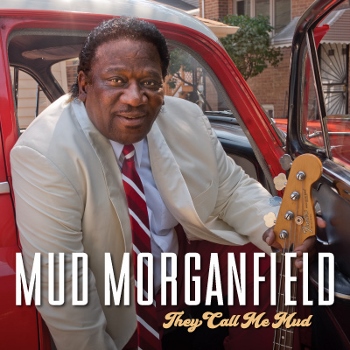There are few artists we look as forward to hearing new music from as those literal sons and daughters of the blues who have devoted their lives to helping to carry on the music — and thus the legacies — of their fathers. And 2018 begins with a healthy dose of that, including, for example, some dynamite new releases from Larry “Mud” Morganfield, son of McKinley Morganfield, a.k.a. Muddy Waters; Bernard Allison, son of Luther Allison; and Deva Mahal, daughter of folk-blues “Maestro” Taj Mahal. Today, we dive into the first two of those recordings, with the promise to take a look at (and listen to) the latter in a separate post soon.
Mud Morganfield, They Call Me Mud (Severn Records)
 The eldest Morganfield son’s third release on Severn Records following his award-winning Son of the Seventh Son and collaboration with harmonica player Kim Wilson on For Pops: A Tribute to Muddy Waters, They Call Me Mud does a superb job of showcasing Morganfield’s vocal and songwriting talents (having written all but two — both covers of his father’s songs — of the album’s tracks); through songs ranging from straight-up blues to jazz, soul, and R&B, Mud proves he’s one of those guys who could sound good singing a telephone book.
The eldest Morganfield son’s third release on Severn Records following his award-winning Son of the Seventh Son and collaboration with harmonica player Kim Wilson on For Pops: A Tribute to Muddy Waters, They Call Me Mud does a superb job of showcasing Morganfield’s vocal and songwriting talents (having written all but two — both covers of his father’s songs — of the album’s tracks); through songs ranging from straight-up blues to jazz, soul, and R&B, Mud proves he’s one of those guys who could sound good singing a telephone book.
But the album is worth listening to as much for the fine band Mud has assembled as for Mud himself, with co-producer and former Muddy Waters Band member Rick Kreher joining on guitar along with Billy Flynn, Studebaker John on harmonica, Sumito Ariyo Ariyoshi on piano, EG McDaniel on bass, Melvin “Pookie Stix” Carlisle on drums, and guests who include harmonica player Billy Branch, guitarist Mike Wheeler, and violinist Anne Harris.
Together, they create some soulful, often groovy, blues that range from such soft, swaying numbers as the horns-laced, Mighty Sam McClain-like “Cheatin’ is Cheatin'” with its delicate piano and tender, almost falsetto, vocals, to the booming voice of a simmering “Oh Yeah” and thick Chicago sound of “Rough Around the Edge”, its piano, harmonica, and guitar solos combining with some nice horns to make for a remarkably cheery telling of a story about dealing with a wife’s boyfriend who “want to hit me in my head”.
Mud and the band, of course, do a fantastic job on Muddy’s two songs, first hitting a creeping “Howling Wolf” about halfway through the album and then the tough shuffle “Can’t Get No Grindin'” a bit later. Not surprisingly, Mud sounds a lot like his father on these tunes, particularly when belting out a “what’s wrong with the mill, people?” or interjecting a “grind, man, grind” in the midst of a solo on the latter, but that also carries through to a number of the other songs, including, for example, the groovy opening title track, on which Mud introduces himself through such boastful, Muddy-esque lyrics as “Well, you know they call me Mud, cuz’ when I love, I love so deep” and “when it come to makin’ love, I can bring it all night long”, also comparing himself along the way to “a rumblin’ earthquake” (“and I’m gonna’ shake you to your chest”) and “a mighty hurricane” (“you never know where I’m gonna’ strike next”) before ending the number with some growls of “how, how, how, how, how”.
From there, the band moves right to the slow, soulful blues grooves of a much more sensitive “48 Days”, on which Mud tries to convince his baby to “please come home to me” in addition to being one of three tracks on which Mud plays bass, another being the peaceful closing instrumental “Mud’s Groove” that features Billy Branch on harmonica.
The album also includes a very pleasantly surprising appearance from one of Mud’s own children, youngest daughter Lashunda Williams, who duets with Mud on the sweet swaying R&B ballad “Who Loves You” that also features Anne Harris on violin, leaving us hopeful that we’ll be hearing more musically from a third generation of Morganfields as well.
Dedicated to both the late Barrelhouse Chuck, who was supposed to be involved in the project, and Mud’s godfather, harmonica player James Cotton, They Call Me Mud is just like the quicksand with which Mud compares himself in the title track: “the more you wiggle (or, in this case, listen), the deeper you’ll sink”!
Bernard Allison, Let It Go (Ruf Records)
 While Mud never got a chance to record or perform with his “Pops”, having only started with music after Muddy died, Bernard Allison had somewhat of a different experience, first playing on one of his father’s recordings at age 13 and then, five years later, joining Luther on-stage for a performance at the Chicago Blues Festival, where they returned in 1989 with Bernard now finally a member of the elder Allison’s band.
While Mud never got a chance to record or perform with his “Pops”, having only started with music after Muddy died, Bernard Allison had somewhat of a different experience, first playing on one of his father’s recordings at age 13 and then, five years later, joining Luther on-stage for a performance at the Chicago Blues Festival, where they returned in 1989 with Bernard now finally a member of the elder Allison’s band.
Nearly three decades later, Bernard is firmly entrenched in a solo career that began even before his father’s death in 1997 (although Bernard of course continued to play with his father until he died), having just released his latest album Let It Go — his first on German label Ruf Records — as well as serving as one-third of Ruf’s current Blues Caravan tour alongside fellow guitarslingers Mike Zito and rising Croatian artist Vanja Sky.
Like Mud’s album, Let It Go‘s dozen tracks includes two of the singer/guitarist’s father’s songs, both handled masterfully by the son, with the album closing on the slow stinging blues of “You’re Gonna Need Me” followed by the tender solo ballad “Castle”. Also included are two other fine covers, with Allison making a breezy country romp of G.L. Crockett’s rockabillyish “Look Out Mabel”, and a jazzy take on Brook Benton’s “Kiddio” that’s thick with snapping fingers, bass, sax, and organ, while the remainder of the songs were either written or co-written by Bernard.
This may be one of the bluesier albums we’ve heard from Allison in a while, as a look at the track listing only starts to reveal through numbers such as the funky opening “Cruisin’ for a Bluesin” and a shuffling “Blues Party” that pays tribute to many of the genre’s masters with lyrics about “hangin’ at Club Heaven” with the likes of Albert Collins, Albert King, Luther Allison, Stevie Ray Vaughan, Koko Taylor, Johnny Copeland, Howlin’ Wolf, Robert Johnson, Robert Lockwood Jr., John Lee Hooker, Willie Dixon, Junior Wells, Johnny Winter, Lonnie Brooks, B.B. King and others.
An even funkier “Night Train” recounts the tale of a bluesman who needs to play a quick gig to pay for his train ride home, while the slow-rocking “Leave Your Ego” — inspired by a famous quote from Bernard’s father urging others to “Leave your ego, play the music, love the people” — includes some biting, Hendrix-like grooves and was co-written by another true son of the blues in Ronnie Baker Brooks (whose hands are among those you see in the picture at the top of our site, along with those of his brother Wayne Baker Brooks and their late father Lonnie Brooks).
The abundance of solos and riffs Allison provides throughout the album aren’t the type that are thrown in for fill or excess, with each carefully positioned to add emotion of its own and helping to keep, often heighten, the listener’s attention to the music and respect for the musician, even on more laidback numbers like the smooth-flowing title track and R&B grooves of “Hey Lady”.
This is one that fans of both generations of Allisons, and the blues more generally, will appreciate and enjoy, so don’t Let It Go past you without checking it out!
